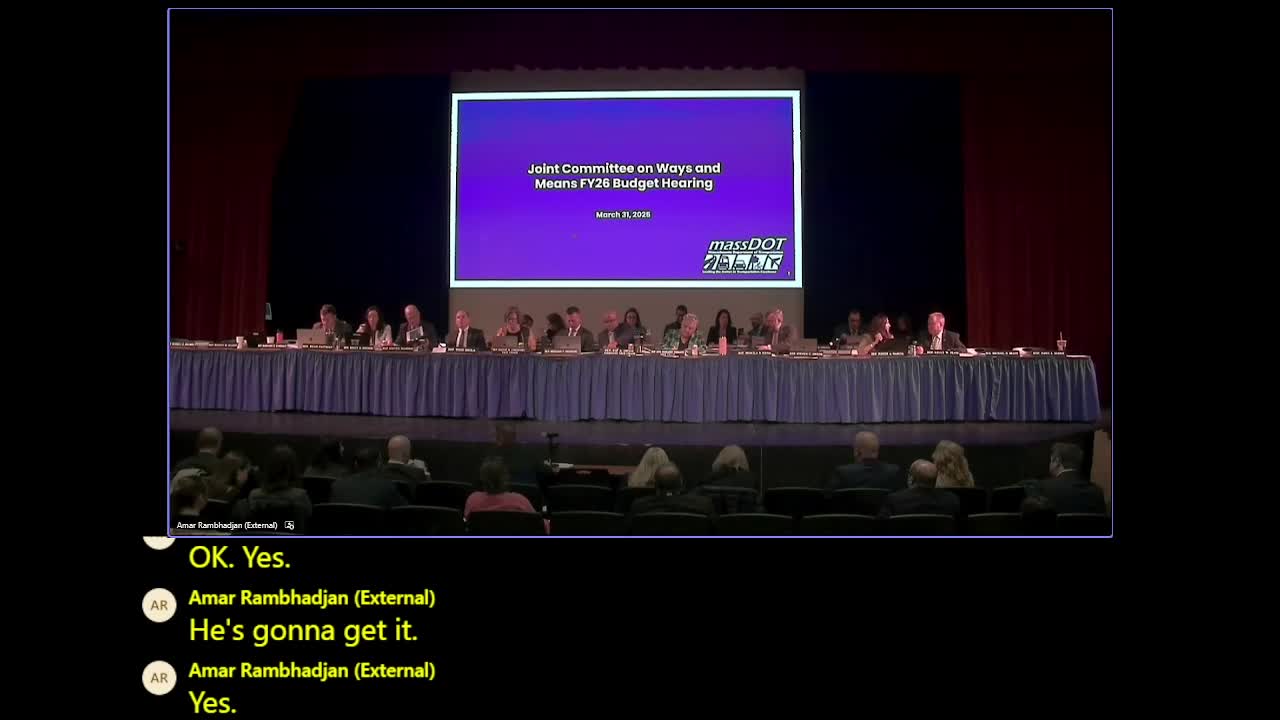MassDOT presents House 1 transportation plan: billions for roads, bridges, MBTA and regional transit
Get AI-powered insights, summaries, and transcripts
Subscribe
Summary
Transportation Secretary Monica Tibbetsnutt and MassDOT leaders told the Ways and Means committee that House 1 continues major investments in roads, bridges, chapter 90, MBTA stabilization and RTA support, and highlighted priorities including culvert repairs, Allston multimodal work and workforce funding.
Monica Tibbetsnutt, Secretary of Transportation and CEO of the Massachusetts Department of Transportation, told the Joint Committee on Ways and Means that the governor’s House 1 budget proposes major investments aimed at maintaining the state’s roads, bridges and transit system and boosting workforce capacity.
“This budget reflects a bold vision for mobility across our state,” Tibbetsnutt said, outlining a package of operating and capital recommendations intended to stabilize MBTA operations, increase Chapter 90 funding for municipalities, and unlock borrowing capacity via fair-share revenue directed to the Commonwealth Transportation Fund.
Why it matters: House 1 proposes multi-year funding intended to address deferred maintenance, improve resilience and support regional transit authorities and the MBTA. The plan would shift additional fair-share revenue into transportation to increase capital borrowing capacity and fund long-term projects that the administration says will deliver road, bridge and transit improvements across the Commonwealth.
Top line items the administration highlighted include roughly $765,000,000 in proposed fair-share allocations to transportation in FY26, a proposal to unlock approximately $5,000,000,000 in transportation capital over the next decade, $1,500,000,000 over five years targeted to Chapter 90 road improvements and $1,500,000,000 for road and bridge life-cycle asset management. The presentation also lists $615,000,000 for the Allston multimodal project, $850,000,000 for MBTA maintenance and power resilience, $200,000,000 for culverts and small bridges statewide, and $110,000,000 in fair-share funding for regional transit authorities (RTAs).
David Pottier, MassDOT chief financial officer, told the committee the non-toll operating budget would increase by 15% year-over-year and said the administration seeks to align snow-and-ice funding more closely with five-year average spending. “House 1 allocates $765,000,000 of fair share funds to transportation,” Pottier said as he walked through the budget arithmetic and the supplemental allocations proposed in the FY24 surplus.
Highway Division priorities: Highway Administrator Jonathan Gulliver described a record year of construction and maintenance activity and presented programs designed to help smaller communities. He noted that in the past year the division advertised 89 construction projects and awarded more than $1.1 billion in new contracts. Gulliver emphasized safety tools and local grant programs such as Complete Streets, municipal paving and the rural roadways program, and he urged committee members to consider the larger chapter-90 increases in the governor’s request.
Regional transit and RTAs: Rail and Transit Administrator Meredith Schlesinger outlined a $204,000,000 RTA package that includes $160,000,000 in contract assistance and $44,000,000 in additional fair-share funding for RTA programs, a $30,000,000 fair-free grant program, $10,000,000 for transit connectivity grants and $4,000,000 to expand community transit grants for older adults and people with disabilities. Schlesinger described ongoing MOUs with each RTA requiring standardized data collection for ridership, assets and financial reporting.
Commuter and inner-city rail: Schlesinger also summarized CompassRail, MassDOT’s inner-city passenger-rail vision, and said near-term projects include track improvements to enable additional Boston–New Haven round trips and planning work for the Boston–Albany (West–East) corridor. She said service improvements depend on federal funding and project-level agreements, and that the Inland route received a $108,000,000 federal award for early actions.
MBTA and service: MBTA General Manager Phil Ng told the committee the T is rebuilding its workforce and service. “We are focused on rebuilding our infrastructure, our service, rebuilding confidence in the T to make public transportation not only viable, but the preferred choice of travel,” Ng said. He cited ridership gains, track improvements, removal of speed restrictions, additions in bus trips and progress on Red/Orange/Green line reliability. Ng also described federal grant wins and the recent launch of South Coast rail service with six new accessible stations and free introductory weekends.
Aeronautics and advanced aviation: Acting Aeronautics Administrator Denise Garcia reviewed a data-driven drone program the Aeronautics Division operates for inspections and emergency-response missions, and she described planning for advanced air mobility and airport electrification pilots. The division reported approximately a thousand drone flights per year and said it is testing “drone-in-a-box” and beyond-visual-line-of-sight capabilities under FAA waivers.
Registry and Real ID: Registrar Colleen Oberle/Ogilvy described RMV efforts to increase Real ID compliance ahead of the federal compliance date, including outreach and new language and accessibility services. She said Massachusetts was at about 57% Real ID compliance at the time of testimony and that the registry had increased appointment availability and launched outreach campaigns to raise awareness.
What was not decided: The presentation was informational; the committee did not vote on House 1 at the hearing. Lawmakers questioned timelines, local impacts and program details. MassDOT leaders said they would follow up on requests for more granular breakdowns of operating details, RTA allocations by provider, and municipal project timelines.
Next steps: MassDOT said it will continue to work with the committee on program details and expects the House 1 numbers to guide appropriation and bonding decisions during the budget process.
